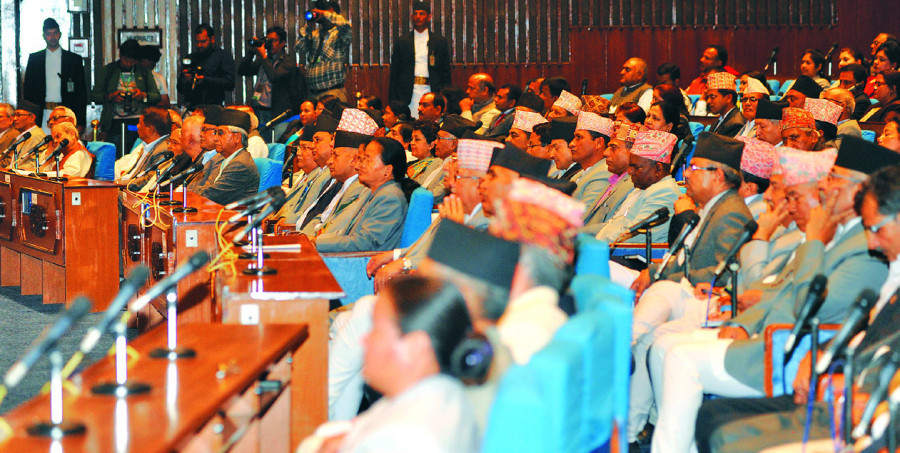Editorial
Ego-centric politicians
Even as the pandemic rages on, they can't see beyond their nose.
Four years since the public voted to elect the three tiers of government in hopes of political stability and democratisation following a bloody ‘people’s war’ and hiccups over the writing of the constitution, politicians are once again embroiled in power games. Even as the pandemic rages on, the country has been taken hostage after Prime Minister KP Sharma Oli dissolved the House of Representatives twice in six months, following infighting in the ruling party. The rift between politicians for a hold on power and influence has pushed the country towards uncertainty. As a direct result, provincial governments have also engaged in similar political manoeuvres as chief ministers prioritise politics over the pandemic.
On Saturday, Krishna Chandra Nepali Pokharel of the Nepali Congress replaced as chief minister of Gandaki Province the CPN-UML’s Prithvi Subba Gurung, a close aide to the prime minister, who lost a vote of confidence in the Provincial Assembly on Friday. Like Oli, the outgoing chief minister had also attempted to dissolve the Provincial Assembly after losing the vote of confidence, but the Congress managed to secure majority votes to claim the government. It could be good news for the Congress, which has finally managed to lead a provincial government, and a significant setback for Oli, as Gurung becomes the first casualty of the Nepal Communist Party's split after close calls in five provinces; but this is only indicative of the political and moral degradation of our politicians at the cost of citizens.
The second year of the pandemic has become a season of no-confidence motions, floor crossings and cabinet reshuffles, not just at the centre, but also in the provinces as the public looks for some respite and a way out of the pandemic. Already burdened with management and legal issues, the provincial governments were only beginning to crawl towards autonomy when the political crisis trickled down from Kathmandu, shaking the very foundations of the federal setup envisioned to guarantee devolution of power. It has exposed how the chief ministers, instead of implementing federalism, only acted as if they were heading administrative units of the centre. In a way, the theatrics that followed the 2017 elections, when the Nepal Communist Party, born of a merger between the CPN-UML and the Communist Party of Nepal (Maoist Centre), took hold of six of the seven provincial governments, has come full circle. But, what’s next?
The developments over the weekend in Gandaki Province, as well as recent upheavals in other provinces, including Province 2 following the participation of the Thakur-Mahato faction of the Janata Samajbadi Party in the federal government, are bound to have an after-effect; but the people who voted the politicians to power are having to face the brunt of the partisan politics and ego-centric politicians amid a public health crisis. To say all this stems from the Oli-Pushpa Kamal Dahal clash, which has led to the current quagmire, is to give a clean chit to other politicians and political parties, which are equally to blame and have shown no concern about the people.
We do not have a House. Both the federal and provincial governments are struggling to hold on to their power. The top political parties are bickering over internal issues and show utter disregard for democratic principles. It is thus no surprise that politicians who’ve promised prosperity and stability for decades continue to dupe voters instead of representing them and taking policy positions on their election promises. The mediocrity of the self-absorbed politicians when the public expects them to come together for the sake of the country has eroded public confidence in government, federalism and even the legal system. This is not the picture Nepalis had in mind when casting their ballots for a new constitution and a way forward after decades of insurgency and instability. For once, the politicians must end their mindless squabbles and get the country out of this quagmire, and face the issues as a democracy should—for the people.




 13.12°C Kathmandu
13.12°C Kathmandu














